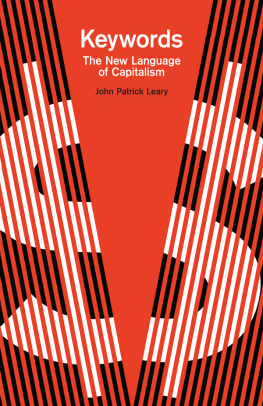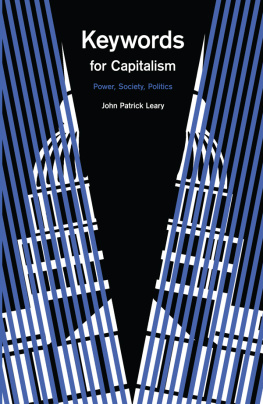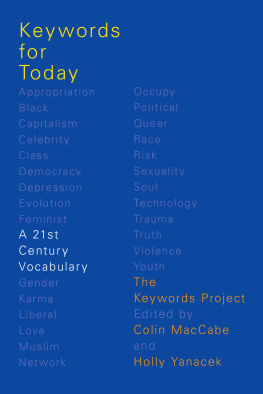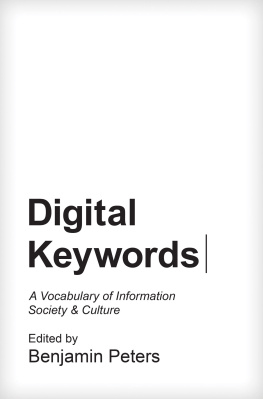
KEYWORDS
THE NEW LANGUAGE
OF CAPITALISM

JOHN PATRICK LEARY

2018 John Patrick Leary
Published in 2018 by
Haymarket Books
P.O. Box 180165
Chicago, IL 60618
773-583-7884
www.haymarketbooks.org
ISBN: 978-1-60846-963-5
Trade distribution:
In the US, Consortium Book Sales and Distribution, www.cbsd.com
In Canada, Publishers Group Canada, www.pgcbooks.ca
In the UK, Turnaround Publisher Services, www.turnaround-uk.com
All other countries, Ingram Publisher Services International,
This book was published with the generous support of Lannan Foundation and Wallace Action Fund.
Cover design by Josh MacPhee.
Printed in Canada by union labor.
Library of Congress Cataloging-in-Publication data is available.
10 9 8 7 6 5 4 3 2 1

For Louisa,
who already has more grit than all the grifters in all the world, and who will need it all in the world she inherits.
Any current curse word can become a word of praise, any current truth must inevitably sound to other people as the greatest lie.
Valentin Voloshinov, Marxism and the Philosophy of Language
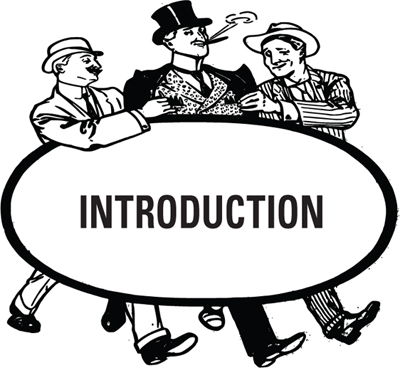
Language (n.) The music with which we charm the serpents guarding anothers treasure.
Ambrose Bierce, The Devils Dictionary
Language, Ambrose Bierce tells us, cannot be trusted, and the sweeter it sounds, the less we should trust it. This is a book about words and their deceptions. The words in this book make up the twenty-first century language of capitalism, a metaphorically rich vernacular in which the defenders of private property speak of virtues and vision, where wage laborers become imaginative artists and agile athletes, and workplaces are transformed into vibrant ecologies and nurturing communities. In this language, the differences between creative resistance to capitalism and creative capitalism, health care and wellness, rebellion and disruption, and working-class power and the commercial slogan of empowerment can be difficult to grasp. These keywords are what Bierce might call charming words used to deprive others of their treasure: if we understood them better, perhaps we might rob them of their seductive power.
Keywords: The New Language of Capitalism is a field guide to the capitalist present, an era of unprecedented technological possibilities to bring humanity togetherso we are regularly told, anywaythat also features privation on a scale comparable to Bierces late nineteenth-century Gilded Age. Are we living in a new stage of capitalism, though, or are todays digital technologies just a different version of our ancestors railroads and six-shooters, our Silicon Valley titans just the newest update to the ketchup and steel tycoons of an earlier, east-coast fantasy of wealth and opportunity? Identifying what makes our moment unique (or not) is no easy task, in part because we are living in it, and in part because the language we have to understand and describe our eras inequality is itself one of the instruments of perpetuating it. How can we think and act critically in the present when the very medium of the present, language, constantly betrays us?
One way to address this question is to go to the words themselvesto their histories and their present-day semantics. Take innovation, todays most popular term for the faith in perpetual improvement that in Bierces day would have been called progress. Long before it was any of the many things it is now taken to bethe entrepreneurial function, an elusive quality of successful organizations, the objective of the American educational systemit was widely regarded as a dangerous vice. For centuries, it was condemned as the heresy of conspirators and false prophetsinnovators upon the word of God. In a multitude of men there are many who, supposing themselves wiser than others, endeavour to innovate, Thomas Hobbes wrote in 1651, and divers Innovators innovate divers wayes, which is a meer distraction, and civill ware. In Shakespeares Henry IV, the King speaks of fickle changelings and poor discontents gaping at the news of hurly-burly innovation. A century later, Edmund Burke thundered that the innovators of revolutionary Paris leave nothing unrent, unrifled, unravaged, or unpolluted with the slime of their filthy offal.
The twentieth century saw a wholesale renovation of innovations slimy reputation. Its twenty-first century association with computing technology means that it no longer connotes religious zeal like it once did; nor is innovation any longer a prohibited individual action, committed by dissidents and heretics. Instead, it is a pragmatic, benevolent process, practiced by individuals but also nurtured by organizations and even by nations. Universities, software corporations, toy makers, museums, banks, pharmaceutical corporations, and soap conglomerates all claim to cultivate and pursue innovation. In the United States government, the importance and goodness of innovation is an issue of bipartisan consensusembraced with equal alacrity by both the Obama and Trump administrations.
Despite this mainstream acceptance and its current association with technology, innovation retains some of its old link to rebellion and prophecy, as the terms use in the business media and popular advertising shows. Break rules and dream is rule #1 of Silicon Valleys ecosystem of innovation, writes one venture capitalist in a column entitled, appropriately enough, The Seven Commandments of Silicon Valley. The innovators celebrated in mainstream politics and business are revolutionaries in skinny jeans, visionary personalities whose brilliance can, by some alchemy, be cultivated and reproduced by the same bureaucracies that, we often simultaneously think, tend to stifle idiosyncratic brilliance. This paradoxical combination of heroic anti-orthodoxy and process-driven orthodoxy makes innovation a virtue of a contradictory age. We live in an era in which an apocalyptic imagination holds sway in our cinemas, television shows, video games, and political campaigns, when the slow-motion disasters of debt and climate change imperil the futures of an entire generation of young people around the world. But it is also a historical moment distinguished, especially in the United States, by a powerful elites faith in the power of technology, and the innovators who wield it, to overcome almost any obstacle. Complex social problems borne of inequality can be solved with technical solutions, and if you learn the skills to master a hyper-competitive economy, you can make it. Need a job? Invent one, suggests Thomas Friedman, that reliable transcriber of ruling-class hobbyhorses, in one of his New York Times columns. In a world and an economy rent and ravaged by other peoples innovations, the lesson seems to be that you can, and must, creatively fend for yourself. Hobbes might have called this state of affairs the war of all against all; we just call it innovation and entrepreneurship.
Next page
